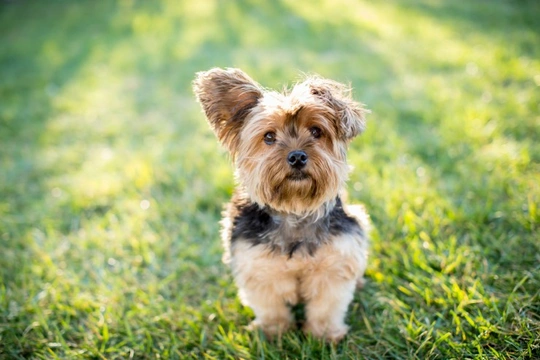
Seven indications that your Yorkshire terrier is anxious or stressed
The Yorkshire terrier is a very popular toy dog breed that is small on size but big on personality, showing all of the core traits of their terrier origins. These cute, friendly and entertaining little dogs tend to be fairly happy go lucky, and they are often very confident and bold given their small size too.
However, like any dog breed and as is particularly often the case with toy breeds, they can be quite sensitive little souls that are apt to become anxious or stressed if they feel insecure or something scares them – and being able to spot and identify the signs of stress and anxiety in your Yorkshire terrier is important.
In this article, we will outline seven indications that your Yorkshire terrier could be anxious or stressed, so that you can make changes to restore them to their normal happy selves. Read on to learn more.
Destructive behaviours
Dogs display destructive behaviours for all sorts of reasons, and it is important to be able to identify normal canine behaviours that may be undesirable in contrast to acting out that develops because of a specific cause.
For instance, as a type of terrier, the Yorkshire terrier often likes to dig, which is normal for dogs but not something that we are always happy with – but if your dog is chewing your things, can’t be trusted to be left alone or otherwise acts out, it may be a symptom of anxiety or stress.
Inappropriate toileting
Even the smallest of dog breeds soon learns not to toilet in the house, and to ask to go outside when they need to do their business. However, if your dog is housetrained and yet begins to do their business in the house, perhaps peeing on your bed or clothing or otherwise wilfully showing their displeasure by apparently forgetting their training, they may be trying to tell you that something is wrong.
Digestive upsets
We’re all familiar with the sick feeling we can get in our stomachs if we feel worried, stressed or anxious – and the same is true for your dog. If your Yorkshire terrier regularly has bouts of diarrhoea, goes off their food or seems to have a sensitive stomach, they may have an allergy to something in their diet – or they may be showing signs of stress.
Skin and coat problems
A sleek, shiny and generally healthy-looking coat is something that is achievable for most Yorkshire terriers unless the dog tends to suffer from allergies, sensitivities or has a chronic skin condition, but if your dog is in good health and their coat is still lacklustre, this indicates a problem.
It is worth considering whether or not your dog’s food is a good fit for them, if they might be showing signs of an allergy or if they have an underlying skin problem that is making them itchy or sore, but if you can rule all of these things out, your dog might be manifesting signs of stress.
A dog that is stressed or anxious a lot of the time will often have a dull, dry coat and a generally unkempt appearance, regardless of what you do to their coat, and this may be the first indication you will get that something is wrong.
Separation anxiety
All dogs, regardless of their size, should be able to be left alone for a couple of hours at a time without becoming anxious or upset, but separation anxiety is a common problem in dogs, particularly small breeds.
Because the Yorkshire terrier is a toy dog breed, they are usually pampered, much-loved pets that get a lot of attention and spend a lot of time with their owners. However, this does mean that if and when you need to leave your dog alone for a while, they may not know how to entertain themselves and be happy doing so, which is something you will need to work on.
Being overly clingy or defensive about their owner
Small dogs don’t know that they’re small, and when you make your dog the centre of your world, your dog will take this on board and may think that they’re the one in charge.
If your Yorkshire terrier is very demanding and always wants to be the centre of attention, they may become snappy or badly behaved when this is not the case, and try to make other people or dogs that you may try to speak to back off, by growling or snapping.
Lethargy and listlessness
A Yorkshire terrier that is anxious and stressed won’t be as keen to engage with life as a whole, and may be reluctant to play, exercise, and socialise. This may mean that your dog spends a lot of time asleep or hiding out somewhere quiet, or that they appear listless and not as keen as you would expect to play and do things with you.



